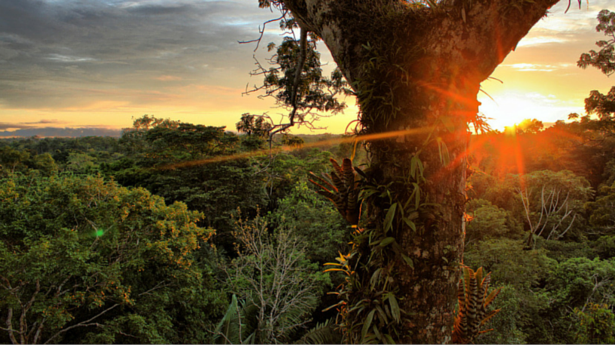Randy Hayes founded Rainforest Action Network in 1985 and has a long history advocating for the rights of people living in our planets’ most threatened environments. We sat down with Randy for a lively and wide-ranging conversation about the genesis of Global Greengrants, which he helped found in the early 1990s, his latest venture—Foundation Earth—and the state of the global environmental movement.
Some 46,000-58,000 square miles of forest are lost each year. How can we save them?
There are two things you need to do to save the rainforest: First, in your own country, you need to get your foot off the throat of these places. Second, you need to support your allies in those countries most affected.
How can supporting grassroots struggles create global change?
The grassroots often know how to get the job done and they’ve got the guts to tell the truth. One of the reasons I believe people should fund small grants to grassroots groups is that small groups are better ecologically truth tellers.
I am a big fan of the small grants model. You can get a lot of “bang for the buck.” But the strategy has evolved and become more sophisticated—in a good way. In the early days, you would hear about a good group with a heroic fight and you just gave them money. More recently, people started saying, “What is the collage of groups involved in the same fight and how do we give all of them the resources they need?” So now, if we want to take on a major transnational corporation with bad projects on four continents, we look at how we can support grassroots projects on all four continents so the industry feels it’s being attacked globally?
Why is a focus on indigenous people’s rights so key to protecting the Earth?
Most times their nature philosophy, their spiritual reverence for nature, doesn’t allow them to [cannibalize the environment] the way Western industrial culture does. Focusing on indigenous cultures has always been particularly important to me. Rainforest Action Network was not just a deep ecology organization, we were also a human rights group with a particular focus on indigenous peoples and indigenous rights.
How can people who have been in the environmental movement for decades steward the next generation of environmental defenders?
We need to provide encouragement and pass on wisdom from generation to generation. It is very important. Look at the Sioux Indians: they believe there are four basic stages of life—youth, warrior, community leader, and elder. All of the stages have to interact in a healthy way. That healthy interaction can be synergistic and powerful. We need the youth marching in the streets with their warrior energy around the right stuff, demanding that this madness stop.
So you put a lot of stock in young people.
I mean, if we take our rhetoric seriously—that this is maybe the end of Earth as we know it and we may be the last generation to have the chance to orchestrate a great ecological U-turn toward a more socially just and ecologically sound society—then change is only going to happen by talking to your neighbor, talking to your family, getting out there in the streets, organizing demonstrations. Most of youth don’t have financial or political power. What they have is grassroots organizing power.
Do you think social media can help?
When people are armchair environmental defenders and think they can click a petition and get something very useful done, I don’t buy it. I just don’t buy it. Clicking your way to saving the planet isn’t going get the job done. We need to really roll-up the sleeves, get in the streets, and make a statement with mass numbers.
What is your vision for the environmental movement?
We need a major re-think of industrial human society, and that starts first and foremost with the economic model itself. Can we ecologize capitalism? We need bigger-ticket solutions. I want the youth to get out there and come up with the re-think. We need a zero-waste, closed-loop, sustainable production-and-consumption economy. We can attach our brush-fire fights in grassroots movement work to a meta-vision of a more socially just and sustainable society.
How do you keep your chin up?
I am not an optimist. We are in trouble. But that doesn’t mean you personally can’t go forward with a good attitude. I’m saying what needs to be said, I’m an ecological truth-teller.

